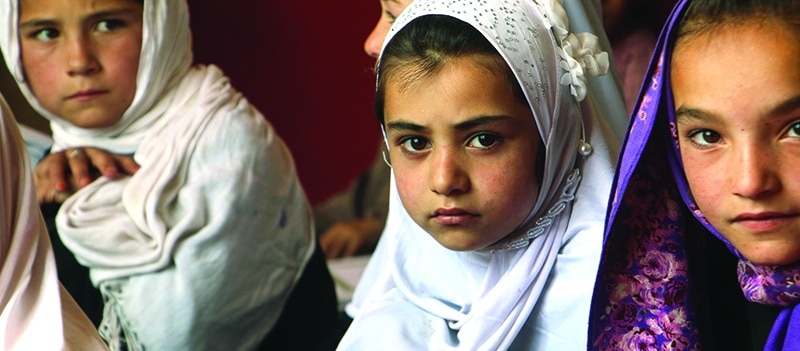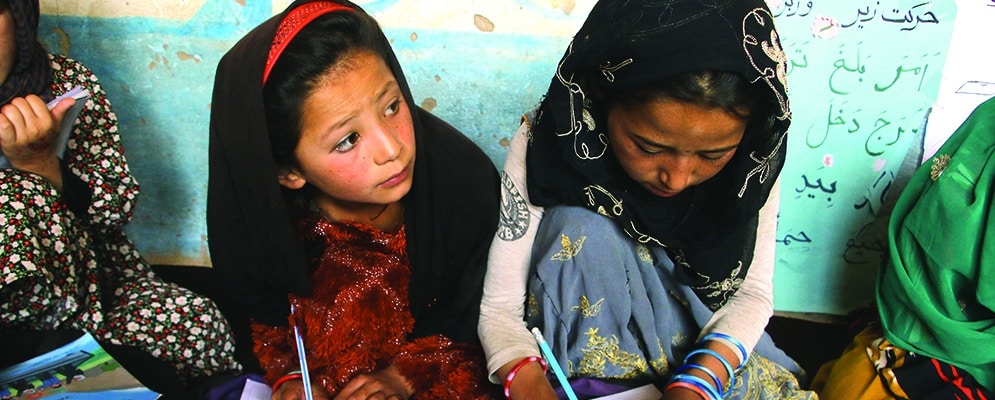Afghans Hold On to Hope and Ask the World to Do the Same
By Molly Shapiro
When the United States withdrew from Afghanistan in August 2021 and the Taliban took over, one of the biggest questions was whether women and girls would lose their hard-fought rights—from freedom of movement to education to career opportunities. Tragically, that question was answered quickly, when the Taliban began issuing a rapid succession of severe edicts that drove women from the workplace, forbid them from education beyond the sixth grade, and banned them from all aspects of public life.
In a little over a year, women had lost almost everything they had gained during the two decades without Taliban rule. No more high school or university. No hope for a job to make money or a meaningful career. No opportunity to go to the gym, a park, a swimming pool, or a public bath. The one thing that remained—the chance to gather and socialize at the beauty parlor—was taken away in July 2023.
Not surprisingly, this desperate situation has led to an alarming rise in mental health issues for many Afghan women and girls. As their freedom to do anything beyond farming and household chores swiftly dwindles to almost nothing, many women and girls are losing hope. A Washington Post article detailing the crisis quoted Shafi Azim, a psychiatrist working in a mental health facility in Kabul, who explained: “They fear they will never be able to go back to work or school. They are isolated and become depressed.”1
CAI and our partners in Afghanistan are finding similar feelings among the women and girls in the regions where we work. “We used to enjoy going to school,” said Leila, a 17-year-old girl from the Badakhshan region. “But now we’re saddened because the schools are closed, and we can’t continue our studies.” Leila has to spend all of her time working in the fields and doing chores for her family. However, she has not given up her dream of one day restarting her education. “Our hope is for schools to reopen, providing opportunities for girls like us.”
The resilience of the Afghan people inspires CAI’s work
Even amidst the sadness and despair, there are still many signs of hope and progress. Young women like Leila are holding on to the idea that one day they can resume their studies. And these glimmers of optimism are what keep CAI and our partners going—determined to do whatever we possibly can to keep hope alive for women and girls.
One of the most important things we can do is to provide education to primary school children, particularly young girls living in the most remote parts of Afghanistan. With the help of our donors, CAI continues to open and support community-based schools—local facilities in small rural villages that are converted into classrooms.
In 2023, we helped establish 252 classrooms, including providing furnishings and learning materials like pens, pencils, and notebooks. Through these schools, we’ve helped 7,700 primary school students—5,360 of them girls—get an education. We’ve also offered essential training to 191 women and 72 men to teach at these schools, giving them opportunities they would not have had otherwise.
One of our partners in this critical effort is WADAN, a local NGO that has been working to bring educational opportunities to all 34 provinces of Afghanistan for close to 20 years. With CAI support, WADAN currently supports 93 community-based schools in Badakhshan province in the country’s mountainous northeast. WADAN recently visited several of these schools to hear from teachers, students, and families.

Children exhibit an extraordinary desire to help others
Anas is a young boy from the village of Dehqan Khana who wants to grow up to be an engineer. While he is grateful for his school and the chance to learn, he is cognizant of all the children in his country who don’t have the same opportunity. “We request from WADAN that it increase the number of schools, so uneducated people can study,”
he said.
This little boy isn’t the only child with an impressive grasp of the needs of others and the desire to help his fellow community members. Several boys say they want their older sisters and female friends to be able to study as well. And many of the young people—boys and girls alike—express the desire of becoming a doctor.
“When I first joined this class, I couldn’t read or write, but now I’ve learned and made wonderful friends,” said Farzaneh. “I aspire to become a doctor and serve my community, as there are no clinics or doctors in our area, and people are in need.”
Some harbor the dream of becoming a teacher, so they can pass on their knowledge to their community. Zakia was able to fulfill that dream and is currently working as a teacher at a WADAN school.
“I’ve been teaching for two years, fulfilling my lifelong dream of becoming a teacher to pass on knowledge,” said Zakia. “Afghanistan’s situation is challenging due to ongoing conflict, but education offers hope for a brighter future. We hope the gates to girls’ education will reopen, as it increases literacy rates and empowers girls to graduate from schools and universities.”
Another teacher, Basira Ahmadi, echoes that sentiment. “This marks my second year of teaching at the school, and I’m delighted to see my students’ progress,” she said.
“I aim to be a successful contributor to society. I call on the international community to support girls’ education, and I urge the government of the Islamic Emirate to provide education for girls. Many children still lack access to education, and I hope the WADAN office can establish more schools.”
The people of these villages are keenly aware of all they have lost, and they yearn to give women and girls the opportunities they once had. But they have not let their struggles and disappointment darken their hopes and dreams. They continue to take advantage of the community schools they do have, and to pursue the educational careers available to them. They ask the international community—those who care about their plight and recognize the value of education—not to lose hope either. The people of Afghanistan are counting on all of us to continue providing support, so that one day, they can restore their rights and freedoms and fully achieve their dreams.






